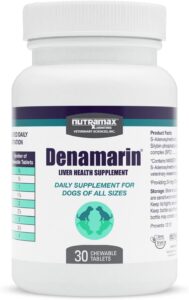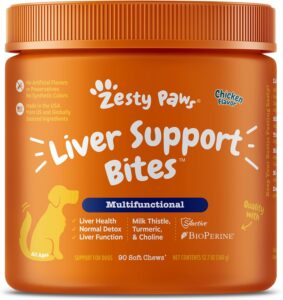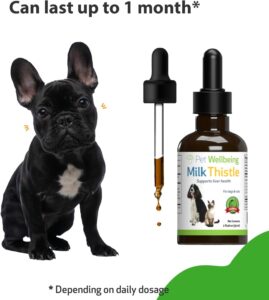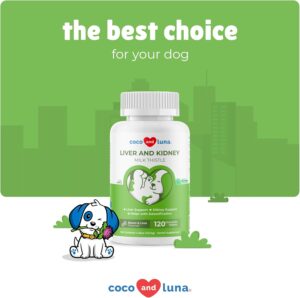*This post may contain affiliate links, meaning we may earn a commission at no extra cost to you based on honest recommendations.*
As a dog owner, I’m always on the lookout for ways to keep my furry friends healthy and happy. One crucial aspect of canine health that often flies under the radar is liver function.
The liver is a vital organ for dogs, playing a key role in detoxification, metabolism, and immune support.
In this comprehensive guide, I’ll explore the best liver supplements available for dogs, breaking down their key ingredients, benefits, and potential drawbacks. I’ll also provide you with the knowledge you need to make an informed decision when choosing a liver supplement for your dog.
Understanding Canine Liver Health
The liver is a remarkable organ that performs over 500 essential functions in a dog’s body. Some of it’s primary roles include:
- Detoxification of harmful substances
- Production of bile for fat digestion
- Storage and release of glucose for energy
- Synthesis of proteins and blood clotting factors
- Metabolism of medications and hormones
Given it’s importance, maintaining optimal liver health is crucial for your dog’s overall well-being. While a balanced diet and regular exercise are fundamental, certain situations may call for additional liver support through supplementation.
Key Ingredients in Liver Supplements for Dogs
When evaluating liver supplements, it’s important to understand the most common and effective ingredients:
1. Milk Thistle (Silymarin)
Milk thistle is a herb that’s been used for centuries to support liver health. It’s active compound, silymarin, is a powerful antioxidant that helps protect liver cells from damage.
Silymarin also promotes the regeneration of liver cells and supports the production of glutathione, a crucial antioxidant for liver function.
2. S-Adenosylmethionine (SAMe)
SAMe is a naturally occurring compound in the body that plays a vital role in liver cell function and regeneration. It supports the production of glutathione and helps maintain cell membrane fluidity, which is essential for proper liver function.
3. N-Acetyl Cysteine (NAC)
NAC is an amino acid derivative that serves as a precursor to glutathione. It helps boost the liver’s detoxification processes and protects against oxidative stress.
4. Silybin
Silybin is the most active component of silymarin found in milk thistle. When combined with phosphatidylcholine, it becomes more bioavailable, enhancing it’s liver-protective properties.
5. Dandelion Root
Dandelion root supports liver function by stimulating bile production and flow. It also has mild diuretic properties that can help flush toxins from the body.
6. Turmeric (Curcumin)
Curcumin, the active compound in turmeric, has potent anti-inflammatory and antioxidant properties. It supports liver health by reducing inflammation and protecting against oxidative stress.
Top Liver Supplements for Dogs
Now that we’ve covered the key ingredients, let’s explore some of the best liver supplements available for dogs:
1. Nutramax Denamarin Liver Health Supplement
Nutramax Denamarin is a veterinarian-recommended liver supplement that combines two powerful ingredients: SAMe and silybin-phosphatidylcholine complex.
Key Features:
- 225 mg of SAMe per tablet
- Silybin-phosphatidylcholine complex for enhanced absorption
- Chewable tablet form
- Weight-based dosing for dogs of all sizes
Pros:
- High-quality, bioavailable ingredients
- Easy-to-administer chewable tablets
- Widely recommended by veterinarians
Cons:
- Higher price point compared to some alternatives
- Some picky eaters may not enjoy the taste
Denamarin is an excellent choice for dogs with diagnosed liver issues or those needing intensive liver support. The combination of SAMe and silybin provides a powerful one-two punch for liver health.
However, the higher cost may be a consideration for long-term use.
2. Zesty Paws Liver Support Supplement
Zesty Paws offers a comprehensive blend of liver-supporting ingredients in a convenient soft chew format.
Key Features:
- 110 mg of Milk Thistle Extract per chew
- 100 mg of Curcumin
- 50 mg of N-Acetyl Cysteine (NAC)
- Additional ingredients include Dandelion Root and BioPerine
- Chicken-flavored soft chews
Pros:
- Well-rounded blend of liver-supporting ingredients
- Appealing soft chew format
- Good value for the price
Cons:
- Lower milk thistle dosage compared to some competitors
- Some dogs may not enjoy the chicken flavor
This supplement is a great option for dogs who need general liver support or those with owners looking for a more comprehensive formula. The inclusion of many useful ingredients provides a broad spectrum of support for liver health.
3. Pet Wellbeing Milk Thistle for Dogs
Pet Wellbeing’s Milk Thistle for Dogs offers a concentrated dose of milk thistle in a liquid form.
Key Features:
- Organic milk thistle seed extract
- Glycerin-based tincture
- Flexible dosing with liquid format
- Free from artificial flavors and preservatives
Pros:
- High-quality, organic milk thistle extract
- Easy to adjust dosage based on dog’s size and needs
- No artificial additives
Cons:
- Limited to milk thistle only
- Some dogs may not enjoy the taste
This supplement is ideal for dog owners who prefer a more targeted approach to liver support. The liquid format allows for precise dosing, which can be especially useful for smaller dogs or those needing specific amounts.
4. Coco and Luna Milk Thistle for Dogs
Coco and Luna’s Milk Thistle for Dogs offers a blend of liver-supporting ingredients in a chewable tablet form.
Key Features:
- Combination of milk thistle extract, dandelion root, and yellow dock
- Added EPA and DHA from fish oil
- Various B vitamins for additional support
- Bacon and liver flavored tablets
Pros:
- Comprehensive blend of liver-supporting ingredients
- Added omega-3 fatty acids for extra benefits
- Palatable flavor for most dogs
Cons:
- Large tablet size may be difficult for some dogs
- Contains soy, a potential allergen for some dogs
This supplement is a good choice for dogs who need liver support along with additional health benefits. The inclusion of omega-3 fatty acids and B vitamins makes it a more well-rounded option for overall health.
Choosing the Right Liver Supplement for Your Dog
Selecting the best liver supplement for your dog involves considering several factors:
1. Your Dog’s Specific Needs
If your dog has diagnosed liver issues, it’s crucial to ask with your veterinarian for personalized recommendations. They may suggest a specific supplement or dosage based on your dog’s condition.
2. Ingredient Quality
Look for supplements with high-quality, bioavailable ingredients from reputable manufacturers. Organic and non-GMO options are often preferable, as they reduce the risk of additional toxins that could stress the liver.
3. Dosage Form
Consider your dog’s preferences and any administration challenges. Some dogs readily accept chewable tablets, while others might do better with liquid supplements that can be mixed into food.
If your dog is particularly picky, a flavored soft chew might be the best option.
4. Additional Benefits
Some liver supplements offer extra ingredients for joint health, skin support, or overall wellness. If your dog has many health concerns, a more comprehensive formula might be beneficial.
However, be cautious of supplements that try to do too much, as they may not provide enough amounts of each ingredient.
5. Value
Compare the cost per serving and the concentration of active ingredients. While price shouldn’t be the only factor, it’s important to find a supplement that fits your budget for long-term use.
Remember that the cheapest option isn’t always the best value – consider the quality and concentration of ingredients as well.
Administering Liver Supplements
Proper administration of liver supplements is crucial for their effectiveness. Here are some tips to confirm your dog gets the most benefit:
Timing
For optimal absorption, most liver supplements should be given on an empty stomach. This typically means about an hour before or two hours after a meal.
However, always follow the specific instructions provided with the product, as some formulations may be designed for administration with food.
Dosing
Dosing is typically based on your dog’s weight, so be sure to measure accurately. Use a kitchen scale if necessary to confirm you’re giving the fix amount.
If you’re unsure about the proper dosage, ask with your veterinarian.
Gradual Introduction
When introducing a new supplement, it’s best to start with a lower dose and gradually increase to the full recommended amount over a week or two. This allows your dog’s system to adjust and helps you watch for any potential side effects.
Consistency
For best results, give the supplement consistently at the same time each day. This helps maintain steady levels in your dog’s system and establishes a routine.
Monitoring
Keep an eye on your dog’s response to the supplement. Look for improvements in energy levels, appetite, and overall well-being.
Also, watch for any adverse reactions such as vomiting, diarrhea, or changes in behavior.
When to Consider Liver Supplements
While liver supplements can benefit many dogs, they’re particularly useful in certain situations:
1. Senior Dogs
As dogs age, their liver function may naturally decline. Supplements can help support ongoing liver health and potentially slow age-related changes.
2. Dogs on Long-term Medications
Some medications, particularly certain antibiotics, anti-inflammatory drugs, and seizure medications, can strain the liver over time. Supplements may help mitigate this stress and support the liver’s ability to process these medications.
3. Dogs with Diagnosed Liver Issues
Under veterinary supervision, supplements can be part of a comprehensive treatment plan for dogs with liver disease or dysfunction.
4. Dogs Exposed to Environmental Toxins
If your dog is regularly exposed to pesticides, herbicides, or other environmental toxins (for example, if you live in an agricultural area), liver support can be beneficial.
5. Preventative Care for At-risk Breeds
Some breeds are more prone to liver issues. These include:
- Labrador Retrievers
- Cocker Spaniels
- West Highland White Terriers
- Doberman Pinschers
- Skye Terriers
For these breeds, proactive supplementation may help maintain liver health and potentially reduce the risk of future problems.
6. Dogs Recovering from Illness or Surgery
The liver plays a crucial role in healing and recovery. Supporting liver function during these times can help your dog bounce back more quickly.
7. Dogs with Poor Appetite or Digestive Issues
Since the liver is integral to digestion and metabolism, supporting it’s function can sometimes help improve appetite and digestive health.
Potential Side Effects and Precautions
While liver supplements are generally safe for most dogs, it’s important to be aware of potential side effects and take necessary precautions:
Possible Side Effects
- Gastrointestinal upset (vomiting, diarrhea)
- Changes in appetite
- Allergic reactions (rare)
- Interactions with medications
Precautions
- Consult Your Vet: Always ask with your veterinarian before starting any new supplement regimen, especially if your dog has existing health conditions or is on medication.
- Start Slow: Begin with a lower dose and gradually increase to the recommended amount to minimize the risk of side effects.
- Monitor Closely: Watch your dog for any changes in behavior, appetite, or bathroom habits after starting a new supplement.
- Avoid Overdosing: More is not always better.
Stick to the recommended dosage unless directed otherwise by your vet.
- Check for Allergies: Be aware of any allergies your dog may have to ingredients in the supplement.
- Pregnancy and Nursing: If your dog is pregnant or nursing, ask with your vet before using any supplements.
- Quality Control: Choose supplements from reputable manufacturers who follow good manufacturing practices (GMP).
Complementary Approaches to Liver Health
While supplements can be beneficial, they’re most effective when combined with other liver-supporting strategies:
1. Balanced Diet
A high-quality, balanced diet is crucial for liver health. Look for dog foods that are:
- Low in fat
- High in easily digestible proteins
- Rich in antioxidants
- Free from artificial preservatives and additives
2. Regular Exercise
Regular, moderate exercise helps maintain a healthy weight and promotes good circulation, which benefits liver function.
3. Hydration
Ensure your dog always has access to fresh, clean water. Proper hydration supports the liver’s detoxification processes.
4. Limit Toxin Exposure
Minimize your dog’s exposure to potential toxins:
- Use natural cleaning products in your home
- Avoid using pesticides and herbicides in your yard
- Be cautious with human foods, as some can be toxic to dogs
5. Regular Check-ups
Schedule regular veterinary check-ups to catch any potential liver issues early. This may include blood tests to watch liver enzyme levels.
6. Stress Reduction
Chronic stress can impact liver function. Provide your dog with a calm environment and plenty of mental stimulation.
The Role of Antioxidants in Liver Health
Antioxidants play a crucial role in supporting liver health by combating oxidative stress. Here’s why they’re so important:
What Are Antioxidants?
Antioxidants are compounds that neutralize harmful free radicals in the body. Free radicals are unstable molecules that can damage cells, including those in the liver.
How Antioxidants Support Liver Health
- Protection Against Oxidative Damage: Antioxidants shield liver cells from the harmful effects of free radicals, which can be produced during normal metabolism or due to exposure to toxins.
- Reducing Inflammation: Many antioxidants have anti-inflammatory properties, which can help reduce liver inflammation.
- Supporting Detoxification: Some antioxidants, like glutathione, directly support the liver’s detoxification processes.
- Promoting Cell Regeneration: Certain antioxidants can stimulate the regeneration of liver cells, helping to maintain liver function.
Key Antioxidants for Liver Health
- Silymarin: Found in milk thistle, this powerful antioxidant is known for it’s liver-protective properties.
- Vitamin E: This fat-soluble vitamin helps protect cell membranes from oxidative damage.
- Vitamin C: While dogs can produce their own vitamin C, supplemental amounts may provide additional antioxidant support.
- Selenium: This mineral is a component of several antioxidant enzymes.
- Beta-carotene: A precursor to vitamin A, beta-carotene has potent antioxidant properties.
Many high-quality liver supplements include a blend of these antioxidants to provide comprehensive support for liver health.
The Importance of Ongoing Liver Care
Supporting your dog’s liver health isn’t a one-time effort – it’s an ongoing process that needs attention and care throughout your dog’s life. Here’s why continuous liver care is so important:
1. Cumulative Effects of Toxins
Over time, even small exposures to toxins can accumulate and impact liver function. Ongoing support helps the liver continuously detoxify and regenerate.
2. Age-Related Changes
As dogs age, their liver function naturally declines. Consistent support can help maintain liver health and potentially slow age-related changes.
3. Adapting to Changing Needs
Your dog’s liver health needs may change over time due to factors like weight changes, new medications, or developing health conditions. Regular monitoring and adjusting of liver support can address these changing needs.
4. Prevention is Key
It’s much easier to maintain a healthy liver than to treat liver disease. Ongoing care can help prevent issues before they start.
5. Supporting Overall Health
The liver’s functions impact nearly every aspect of your dog’s health. By consistently supporting liver health, you’re contributing to your dog’s overall well-being.
Remember, while supplements can be a valuable part of liver care, they’re most effective when combined with a healthy lifestyle, regular veterinary check-ups, and a loving, stress-free environment.
People Also Asked
What are the signs of liver problems in dogs?
Signs of liver problems in dogs can include:
- Loss of appetite
- Weight loss
- Vomiting or diarrhea
- Increased thirst and urination
- Yellowing of the eyes, gums, or skin (jaundice)
- Behavioral changes or confusion
- Abdominal swelling
- Dark urine
Can milk thistle help dogs with liver disease?
Milk thistle can be useful for dogs with liver disease. It’s active compound, silymarin, has antioxidant and anti-inflammatory properties that can help protect liver cells and support liver function.
How long does it take for milk thistle to work in dogs?
The effects of milk thistle can vary depending on the dog and the specific liver condition. Some dogs may show improvement within a few weeks, while others may take several months to see significant benefits.
Are there any natural liver detox methods for dogs?
Natural liver detox methods for dogs include:
- Feeding a high-quality, low-fat diet
- Ensuring adequate hydration
- Providing regular exercise
- Using liver-supporting herbs like milk thistle and dandelion root
- Reducing exposure to environmental toxins
Can liver supplements help with canine liver enzyme elevation?
Liver supplements may help with elevated liver enzymes in dogs by supporting liver function and reducing inflammation. However, it’s crucial to work with a veterinarian to decide the underlying cause of enzyme elevation and develop an suitable treatment plan.
What foods are good for dogs with liver problems?
Foods that can be useful for dogs with liver problems include:
- Lean proteins like chicken or fish
- Easy-to-digest carbohydrates like white rice or sweet potatoes
- Vegetables like carrots and green beans
- Eggs (in moderation)
- Low-fat cottage cheese
How often should I give my dog liver supplements?
The frequency of liver supplement administration depends on the specific product and your dog’s needs. Most supplements are given daily, but always follow the dosing instructions on the product label or as directed by your veterinarian.
Can liver supplements prevent liver disease in dogs?
While liver supplements can support liver health, they can’t guarantee prevention of liver disease. A combination of a healthy diet, regular exercise, minimal toxin exposure, and suitable supplementation can help reduce the risk of liver problems.
Are there any side effects of giving dogs liver supplements?
Most liver supplements are safe, but potential side effects can include:
- Gastrointestinal upset
- Changes in appetite
- Allergic reactions (rare)
Always start with a low dose and watch your dog for any adverse reactions.
How do I know if my dog needs liver supplements?
Signs that your dog might benefit from liver supplements include:
- Age (senior dogs)
- Breed predisposition to liver issues
- Long-term medication use
- Exposure to environmental toxins
- Diagnosed liver problems
Consult with your veterinarian to decide if liver supplements are suitable for your dog.
Key Takeaways
- Liver health is crucial for your dog’s overall well-being, impacting everything from detoxification to metabolism.
- Key ingredients in liver supplements include milk thistle, SAMe, NAC, and dandelion root.
- When choosing a liver supplement, consider your dog’s specific needs, ingredient quality, dosage form, and value.
- Start with a lower dose and gradually increase to the full recommended amount when introducing a new supplement.
- Liver supplements can be particularly useful for senior dogs, those on long-term medications, and breeds prone to liver issues.




